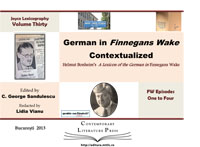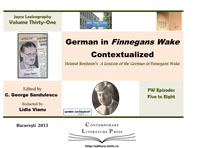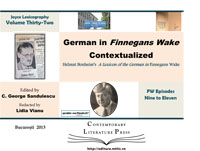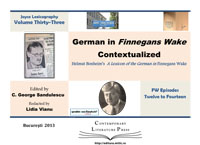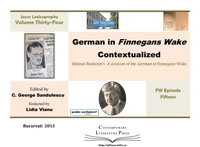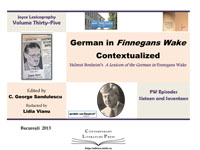C. George Sandulescu:
German in Finnegans Wake Contextualized.
Helmut Bonheim's A Lexicon of the German in Finnegans Wake.
Joyce spoke German fluently. He made his family speak German while they lived in Zurich, and his children even went to school there. His grave is in Zurich too. The 17 years he put into the writing of the 17 chapters of
Finnegans Wake made use of almost 4,000 German words and phrases; we learn this from Helmut Bonheim's
A Lexicon of the German in Finnegans Wake, which the
Contemporary Literature Press is now re-issuing. This new edition of Bonheim's
Lexicon tags the full FW text to his list.
The author himself discussed in his Preface the importance of the larger context for anyone who tries to understand
how and why Joyce turned to German. Following his idea, this re-issuing of the
German Lexicon of FW offers the reader both a German key and an additional means of understanding Joyce's last and most difficult book .
It is difficult to see how it is possible to make a reader feel he is reading a text in over forty languages more or less at the same time. Why Joyce mixed them, and how he combined letters and sounds, so as to be English, French, German, Romanian, and so many more languages at once is a complicated issue. Our insistence on Joyce's use of German lies in the fact that, of all the 40 languages used in the book, the German listing is by far the best and most accurate dictionary. The contextualized grid we are offering now is in fact an invitation to the reader to purchase Helmut Bonheim's actual book and have it in his own hands. It is the result of a close friendship and cooperation with Fritz Senn, a Joyce scholar himself, and the creator of the famous
Zurich James Joyce Foundation. We hope that our reprocessing of this
German Lexicon will lead the reader to a renewed examination of Professor Bonheim's own book.
Joyce's life ended in Zurich two years after the publication of
Finnegans Wake. It is conceivable that the ultimate meaning of this enigmatic text, which still remains silent in many ways, depends to a certain extent on the languages he spoke in that geographical area: we must not forget that Switzerland has four national languages, including Italian.
C. George Sandulescu and Lidia Vianu
Please click on the link below and choose "Save file" to download the book in .pdf format
Vol. 30. German Contextualized - Episodes 1 to 4
Vol. 31. German Contextualized - Episodes 5 to 8
Vol. 32. German Contextualized - Episodes 9 to 11
Vol. 33. German Contextualized - Episodes 12 to 14
Vol. 34. German Contextualized - Episode 15
Vol. 35. German Contextualized - Episode 16 to 17
James Joyce vorbea curent limba germană. Cât timp a locuit cu familia la Zürich, se vorbea numai limba germană în casă, iar copiii ai lui au făcut şi şcoala acolo. Mormântul lui Joyce se află şi el tot la Zürich. în cei 17 ani cât i-a luat să scrie cele 17 episoade care alcătuiesc
Finnegans Wake, Joyce a folosit aproximativ 4.000 de cuvinte şi expresii germane; aflăm acest lucru din cartea lui Helmut Bonheim
Dicţionar de cuvinte germane în
Finnegans Wake, pe care îl reeditează în acest moment editura
Contemporary Literature Press. Această a doua ediţie pe care o scoatem are un element nou: în ea apare şi textul integral al lui Joyce, în paralel cu lista de cuvinte a lui Bonheim.
Autorul însuşi afirmă în Prefaţa sa că nu ne putem lipsi de contextul extins al cărţii lui Joyce atunci când cercetăm cum şi de ce a recurs Joyce la limba germană. Această reeditare a
Dicţionarului de cuvinte germane în FW se situează pe linia ideii lui Bonheim: volumul nostru, însă, pe lângă reluarea unei metode de a identifica cuvintele germane, oferă şi o cheie în plus, care sperăm să ajute la descifrarea acestei ultime cărţi a lui Joyce, care este şi cea mai grea dintre toate.
Este greu de explicat cum a fost cu putinţă ca un scriitor să creeze impresia că citim în patruzeci de limbi străine cam în acelaşi timp. Nu e deloc uşor să înţelegem de ce a amestecat Joyce limbile străine, cum a amestecat el literele şi sunetele aşa încât ele să fie în acelaşi timp englezeşti, franţuzeşti, germane, româneşti. Revenim asupra limbii germane din simplul motiv că, dintre toate cele peste 40 de limbi străine folosite în cartea lui Joyce, numai germana are în acest moment un dicţionar cu adevărat de cea mai bună calitate. Tabelele contextualizate din volumul de faţă sunt, în ultimă instanţă, o invitaţie: sperăm că cititorii vor cumpăra şi vor citi cartea lui Helmut Bonheim pe hârtie. Ea este rodul prieteniei şi colaborării cu Fritz Senn, cercetător Joycean el însuşi, întemeietorul
Fundaţiei James Joyce din Zürich. Publicăm
Dicţionarul de cuvinte germane cu intenţia expresă de a recomanda încă o dată cititorului să cumpere cartea profesorului Bonheim.
Joyce a murit la Zürich la doi ani după ce publicase
Finnegans Wake. Ar fi firesc, aşadar, ca sensul ascuns al acestei cărţi enigmatice, înţelesul ei încă învăluit în tăcere, să aibă în mare parte legătură cu limbile care se vorbesc în acel loc: după cum bine ştim, în Elveţia există patru limbi oficiale, una dintre fiind italiana.
C. George Sandulescu şi Lidia Vianu
Pentru a descărca volumele în format PDF vă rugăm să apăsați legăturile de mai jos:
Vol. 30. German Contextualized - Episodes 1 to 4
Vol. 31. German Contextualized - Episodes 5 to 8
Vol. 32. German Contextualized - Episodes 9 to 11
Vol. 33. German Contextualized - Episodes 12 to 14
Vol. 34. German Contextualized - Episode 15
Vol. 35. German Contextualized - Episode 16 to 17
Back to Language Studies
